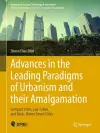
Advances in the Leading Paradigms of Urbanism and their Amalgamation
Simon Elias Bibri - Hardback
£179.99
Dr. Simon Elias Bibri is Assistant Professor at the Norwegian University of Science and Technology (NTNU), Department of Computer Science and Department of Architecture and Planning, Trondheim, Norway. His intellectual pursuits and endeavors have resulted in an educational background encompassing knowledge from, and meta–knowledge about, different academic disciplines. He holds the following degrees:
1. Bachelor of Science in computer engineering with a major in software development and computer networks
2. Master of Science–research focused–in computer science with a major in Ambient Intelligence
3. Master of Science in computer science with a major in informatics
4. Master of Science in computer and systems sciences with a major in decision support and risk analysis
5. Master of Science in entrepreneurship and innovation with a major in new venture creation
6. Master of Science in strategic leadership toward sustainability
7. Master of Science in sustainable urban development
8. Master of Science in environmental science with a major in ecotechnology and sustainable development
9. Master of Social Science with a major in business administration (MBA)
10. Master of Arts in communication and media for social change
11. Master of Science with a major in economics and management
12. Ph.D. in computer science and urban planning with a focus on data–driven smart sustainable cities of the future
Bibri has earned all his Master’s degrees from different Swedish universities, namely Lund University, West University, Blekinge Institute of Technology, Malmö University, Stockholm University, and Mid–Sweden University.
Before embarking on his long academic journey, Bibri had served as a sustainability and ICT strategist, business IT engineer, project manager, researcher, and consultant. Over the past years and in parallel with his academic studies, he has been involved in a number of research and consulting projects pertaining to smart sustainable cities, sustainable cities, green innovation, sustainable business model innovation, and green ICT strategies.
Bibri's current research interests include smart sustainable urbanism, sustainable urbanism, data–driven smart urbanism, scientific urbanism, urban science, and data–intensive science, as well as big data computing and its core enabling and driving technologies, namely sensor networks, data processing platforms, cloud and fog computing infrastructures, and wireless communication networks.
Bibri has a genuine interest in the interdisciplinary and transdisciplinary research. His general research interests fall within the following areas:
• ICT of ubiquitous computing (i.e., Ambient Intelligence, the IoT, and Sentient Computing)
• Big data science and analytics
• Sustainable cities (e.g., compact city, eco–city, green city, environmental city, symbiocity)
• Smart cities (e.g., real–time city, data–driven city, ambient city, ubiquitous city, sentient city)
• Sustainability transitions and socio–technical shifts
• Philosophy of science and scientific and epistemological paradigm shifts
• Science, technology, and society (STS)
• Technological innovation systems
• Industrial ecology (e.g., industrial symbiosis, eco–industrial parks, smart urban metabolism)
• Environmental and technology policies
Bibri has authored five academic books whose titles are as follows:
1. The Human Face of Ambient Intelligence: Cognitive, Emotional, Affective, Behavioral and Conversational Aspects, Springer, 07/2015
2. The Shaping of Ambient Intelligence and the Internet of Things: Historico–epistemic, Socio–cultural, Politico–institutional and Eco–environmental Dimensions, 11/20153. Smart Sustainable Cities of the Future: The Untapped Potential of Big Data Analytics and Context–Aware Computing for Advancing Sustainability, Springer, 03/2018
4. Big Data Science and Analytics for Smart Sustainable Urbanism: Unprecedented Paradigmatic Shifts and Practical Advancements, Springer, 05/2019
5. Advances in the Leading Paradigms of Urbanism and their Amalgamation: Compact Cities, Eco–cities, and Data–Driven Smart Cities, Springer, 06/2020